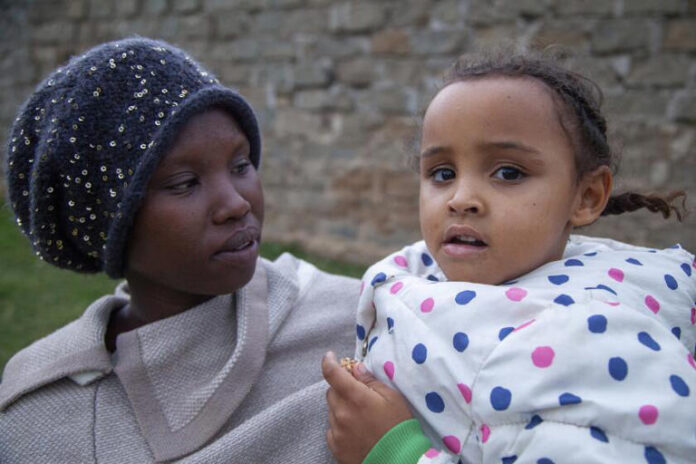
In the picturesque town of Nanyuki, Kenya, the echoes of laughter and hope are being overshadowed by painful stories of identity and abandonment.
Meet Louise Gitonga, a 23-year-old Kenyan whose light skin sets him apart in a society that struggles to accept diversity. Louise, born to a British father he has never met, is one of many biracial children left in limbo following relationships involving British soldiers during their training in Kenya.
“I feel excluded and misunderstood,” Louise lamented, revealing the deep scars of an identity crisis that has led him to alcoholism and despair. He recalls the hurtful nicknames he faces daily: “I’m called a white man or an albino, and it cuts deep.” His mother, Wandia, recounts a heart-wrenching moment when she had to pay extra school fees simply because her son looked “too white.” She reflects on her husband Paul Wachira’s struggles to shield Louise from probing family questions, highlighting the stigma attached to biracial identities in conservative Kenya.
Now, hope flickers on the horizon, spearheaded by Kenyan lawyer Kelvin Kubai, who represents Louise and nine other children of British servicemen. With plans to take action in the British courts, Kubai aims to shine a spotlight on the longstanding issue of accountability regarding the British military’s treatment of local women—and the innocent children left in their wake.
“The circumstances of these children’s births are often shrouded in unanswered questions,” Kubai stated, emphasizing the complex nature of their origins. He is determined to secure British citizenship for the minors, citing existing laws that support their eligibility. More than just a bureaucratic endeavor, this quest is about reclaiming identities and finding the fathers who may never have acknowledged them.
But it’s not just the younger generation yearning for recognition. The fight for justice is shared by adults like David Mwangi Macharia, 68, who carries the burden of living as a biracial child of a British soldier. “They call me ‘British,’ yet I struggle to find work,” Macharia shared, reflecting on his years of discrimination and the dismissive attitudes of those around him.
Women like Jenerica Namoru, 29, have also suffered in silence. After a brief relationship with a British soldier, who initially participated in her child’s life but later withdrew support, she faced repeated rejections from the British Army Training Unit Kenya when seeking assistance. “They wouldn’t listen. At times, they blocked me from entering the gate,” Namoru recounted, her frustration palpable.
Despite the historical weight of these stories, many believe that the British military and their government have failed to acknowledge their responsibilities. The Kenya National Commission on Human Rights has documented over 200 allegations of sexual misconduct against British troops, yet justice remains elusive. “They want to put a Band-Aid on a wound instead of treating it properly,” said Marion Mutugi, a commissioner at the KNCHR, as she lamented ongoing intimidation faced by local human rights defenders.
The tale of Agnes Wanjiru adds a tragic dimension to these events. After losing her life in 2012, allegedly at the hands of British soldiers, the case serves as a grim reminder of the necessary discourse around accountability and recognition for the victims of these unresolved injustices.
As Kubai prepares the groundwork for his case in the UK, he regards each child’s journey not just as a search for legal validation, but as a step toward healing the deep emotional scars that have arisen from neglected identities. “These children did not choose this life. We must confront their reality and bring their stories into the light,” he declared passionately.
In a world where identity should be celebrated rather than ridiculed, the struggle of Kenya’s biracial children and their families continues. It is a call for justice, understanding, and the chance to finally emerge from the shadows of their hidden histories.
Tiro writes for the Associated Press.
This story originally appeared in Los Angeles Times.


















